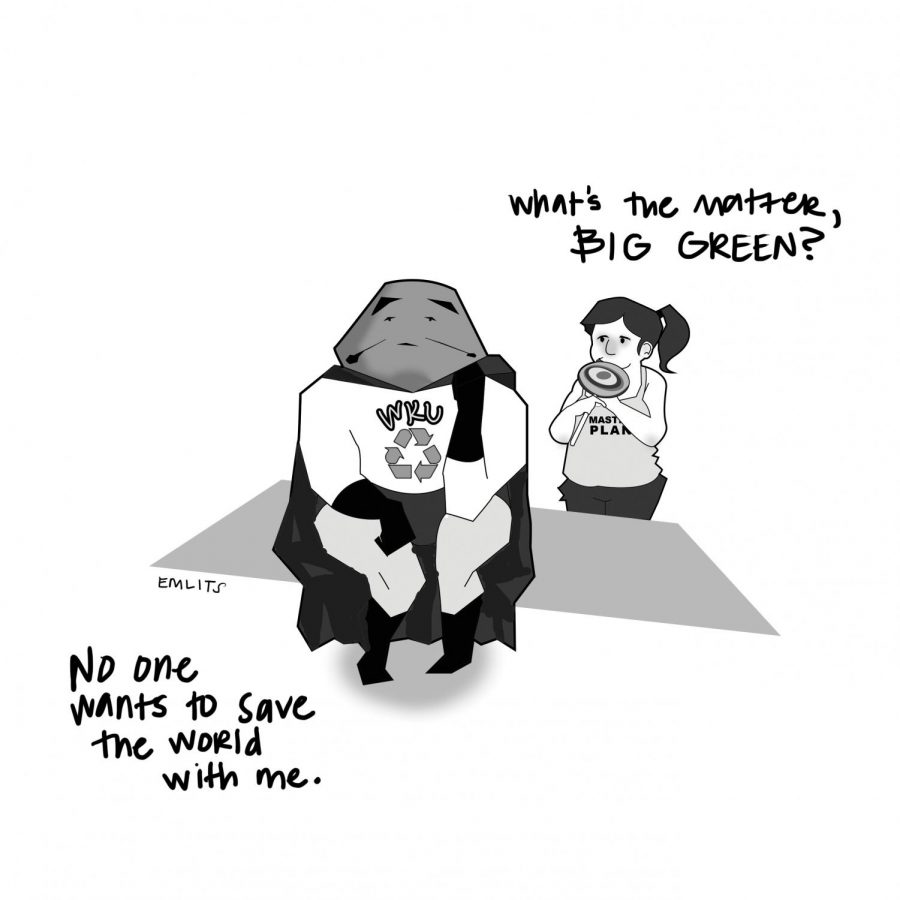Big Red is going green. Why aren’t you?
August 26, 2014
The Issue: WKU is working to improve environmental practices, but students lack involvement.
Our Stance: Student participation could make WKU a leading university in sustainability.
WKU’s campus contains environmentally friendly practices everywhere you turn, but the efforts are wasted if students don’t do their part.
Recycling services on the Hill couldn’t be easier to use. WKU is littered with single-stream recycling bins, meaning you don’t even have to sort out your recycling. Regardless, every year these bins get treated as additional garbage cans.
Sara Hutchison, WKU’s recycling and surplus coordinator, estimates that an average of 50 percent of waste on campus could be recycled, but large amounts are going in the trash. Increased usage of the recycling containers throughout campus, as well as student participation in helping to recycle, could change that.
WKU has only one full-time employee dedicated to picking up all of the recycling on campus. According to Hutchinson, students picking an area to monitor for recycling pick-ups could drastically help the amount of recycled material we produce.
Downing Student Union and the new Honors College and International Center are designed to receive Leadership in Environmental and Energy Design certifications. They’ll be joining Gary Ransdell Hall in the ranks of on-campus buildings with LEED certifications. New floors are being made from recycled glass. Spacious windows allow for maximum natural lighting. Locally sourced lumber is used for construction.
Parking is obviously a huge problem this year. With around 250 parking spaces missing from campus, driving is looking much less attractive. WKU students could complain and fight over parking spaces, or they could grab a bike and start riding. Big Red Bike rentals are free to students, and we have four bike repair stations on campus.
There are several rain-collection reservoirs around campus, and some are used to water flower gardens. They keep our campus beautiful without wasting a drop of water. Sadly, even with water fountains available in nearly every building on campus, students will still use disposable plastic bottles.
Fresh Food Company has produced no waste since installing their infamous compost machine. Everything you throw away is composted and used on local farmland. Even the straws and napkins are completely compostable.
Additionally, this semester Fresh is premiering its tower gardens. Spices used to season the food are being grown right inside the facility. Locally produced dairy and wheat products are used in Fresh as well.
WKU buildings have a carefully managed LED lighting system that only keeps lights on when rooms are in use. Students can do their part and turn out the lights or throw open their windows for natural lighting during the day.
Even students living off campus could improve. Cut down on the electric bill by opening the blinds. Take advantage of Bowling Green’s recycling services. Partake in the local farmer’s market.
Of course, WKU does fall short on some things. Many of the older dorms on campus aren’t pioneering sustainability practices. There isn’t a convenient way to recycle glass on the main campus. Even with its pitfalls, one of the biggest things WKU is doing right is sustainability. Students should follow suit.
WKU could be known for helping to save the planet. Students can sign up for a ‘green tour’ of campus to see for themselves what’s being done around them. We need a student body that sees what’s already being done and asks what they can do to help.
Solar-thermal panels on the roof warm Preston Center’s swimming pools. All of campus is heated with natural gas. The Guthrie Bell Tower’s clockface is illuminated by LED lights. Big Red is saving the planet. What are you doing?












